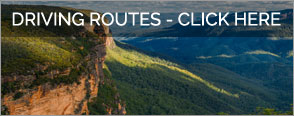Travel safely, tread softly, camp lightly
Visitors can help to protect the Greater Blue Mountains for the world and for all time, while also looking after their own safety. Most of the natural hazards that exist in any wild area can be avoided by the careful visitor to the Greater Blue Mountains.
Walking
- Plan your walks carefully and within your ability. Seek a weather forecast, track information and use a map. Tell someone where you are going and when you return.
- Observe all fire restrictions and stay out of the bush in very high to extreme fire danger.
- Wear strong shoes, sunscreen, protective clothing and a hat. Carry a first aid kit and warm and waterproof clothing. The weather can change quickly at any time in the mountains.
- Carry enough drinking water and food. Bring all your rubbish back with you.
- Keep to marked tracks (don't short-cut) and use the established lookouts.
- Stay inside handrails and safety fences and stay well back from other cliff edges.
- Check water before swimming and never dive into a rockpool, creek, lake or river.
- Keep children close and under control to protect them from cliffs, pools and other hazards.
- Only walk off marked tracks if you have the necessary skill and experience, have a compass and topographic maps and know how to use them.
- Avoid walking on soft and sensitive vegetation and take great care not to break rock edges.
- All animals, plants and wildflowers are strictly protected.
- Walk quietly to avoid disturbing wildlife - and increase your chance of seeing some.
- Never disturb snakes or try to kill them.
Camping
- Use a fuel stove instead of a fire.
- If you must have a fire, use an existing fireplace - and keep your fire small!
- Do not attempt to burn any rubbish other than paper.
- Avoid camping on soft, wet and sensitive ground.
- Never dig trenches and try to cause as little disturbance to the site as possible.
- Use rubbish bins if provided or take out all rubbish.
- Never feed animals (its bad for them!).
- Don't use detergents, soaps or toothpaste in the bush unless in proper facilities.
- Use toilets where provided or bury human waste at least 100 metres from any watercourse and 15 cm deep (or carry it out).
- Never feed native birds or animals.
- Use soft footwear around camp.
Aboriginal Sites
- Never touch or walk on rock art, engravings or grinding grooves or mark them in any way.
- Avoid raising dust near rock art as this is a major cause of gradual damage.





